#bheema
Text
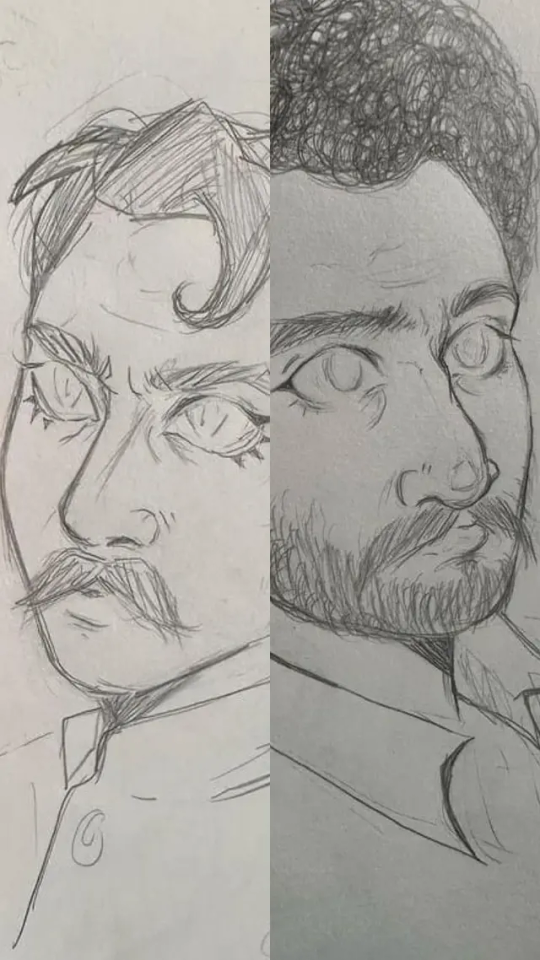
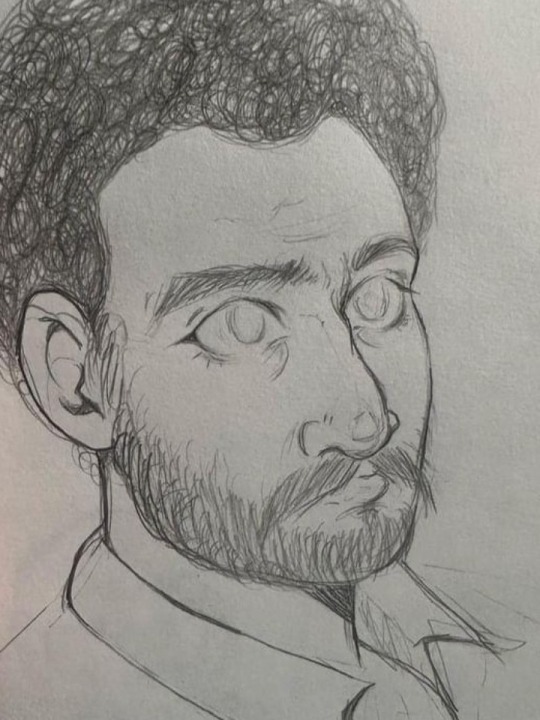
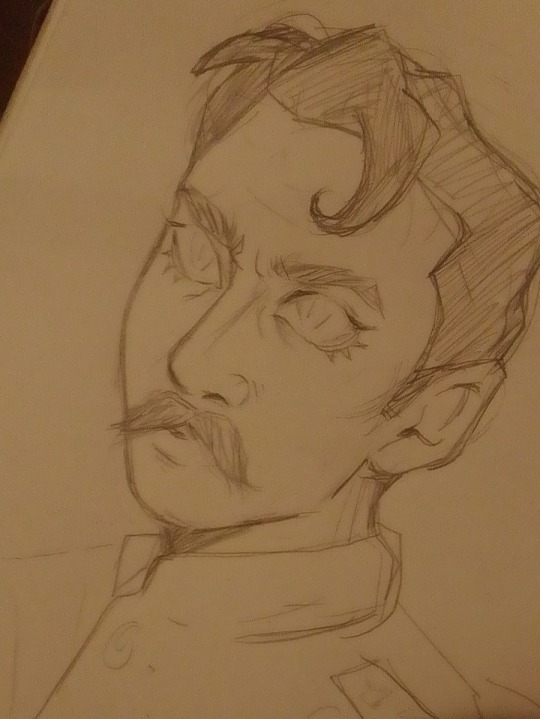
#rrr movie#rrr fanart#bheem rrr#ram rrr#rrr#rambheem#alluri sitarama raju#komaram bheem#bheema#bollywood#rambheem fanart
57 notes
·
View notes
Text
Duryodhan: How do you just eat when there's a dead guy laying there?
Bheem: What, is that rude? Am I supposed to share?
#incorrect mahabharat quotes#incorrect quotes#mahabharat#hindu mythology#incorrect mahabharata quotes#mahabharata#Duryodhan#bheema#bhim#duryodhana#hindu memes#hindublr#desiblr#source: psych#I'm tired#mod s is always tired#mod: s
49 notes
·
View notes
Text

Today I bring Bheema and Draupadi. Tommorow, who knows?
67 notes
·
View notes
Text

Draupadi and her Five Husbands
Co-hosting a weekly pride drawing prompt thing on Instagram but thought I'd post the work here too!
Week 2's prompt was 'Mortals' and I chose to portray the one and only mythological examples of polyandry to my knowledge - Draupadi who was married to 5 Pandava brothers.
[Dense Hindu canon ramble up ahead]
Back in the day, princesses could choose their own husbands and a sort of a courtship contest would be held to win the princess' hand and prove yourself to her. This custom was called swayamvar (swayam = self, var = husband) and all 5 Pandav brothers, princes themselves, participated in Draupadi's Swayamvar. Arjun won the contest, and keeping royal politics in background among other things, Draupadi agreed to marry Arjun. When the five brothers returned home, and told their mother 'Look what/who we brought home' (non-translatable wordplay), their mother said without looking, 'Split (it) between the 5 of you'. Here's where the story and interpretation goes awry. Most modern interpretations depict Draupadi as being tortured, forced to marry 5 MEN! No eyebrows are raised when a king marries 5 women though. Krishna, a king from the same story, had 16,000 wives and several relationships outside of wedlock. Never is Krishna portrayed as tortured and oppressed.
Draupadi was fire herself — that's not a metaphor. She was born of the fire of vengeance her father had for a childhood friend. She would not have stayed in a situation she was forced in. The Pandavas even had a set up where the other brothers wouldn't interrupt Draupadi's time with one of them. Each Pandava themselves also had multiple relationships with other women but Draupadi was still their queen consort (patrani).
Despite modern interpretations, misogynistic interpretations, queerphobic interpretations, I would like to believe their relationship(s) were an early example of ethical nonmonogamy and polyamory. And being the protags of the epic, it also reflects how acceptable this would have been perhaps at some point in time. We may never know for sure, but one can hope....
#hindu mythology#hinduism#pride#pride 2023#draupadi#pandav#pandava#mahabharat arjun#mahabharat#mahabharata#arjuna#arjun#yudhishthir#bheema#bheem#nakul#sahdeva#sahdev#original art#fanart#my art
88 notes
·
View notes
Text
how i imagine draupadi's relationship was with her husbands
Draupadi Yudhishthir: They both would spend hours reading together. Draupadi was a curious soul and Yudhisthir was more than happy to suggest and talk about books with his beloved wife. They both would spend time next to each other in a comfortable, peaceful silence. They would sometimes meditate together too. Yudhisthir would leave books around her with small letters inside.
Draupadi Bheema: Draupadi quickly realised the easiest way to Bheema's heart was through cooking for him and that's what she did. Bheema would help her cook a lot. Bheema would often bring fruits and leave them around her as gifts. Bheema would always be around to protect her no matter what. I also believe Draupadi caressed his cheeks a lot idk why I think that but I do.
Draupadi Arjuna: We all know she was in love with him the most. She would sneak glances at him from time to time. Arjuna too looked at her when she wasn't looking. He would accompany her to the temple a lot and would put gajra in her hair. Because he was a shy soul he found it difficult to hold a conversation but you would always find them glancing when the other isn't looking and giving each small smiles across the room.
Draupadi Nakula: They both talked only sometimes, small conversations, little pranams when they saw each other. Nakula would sometimes trach her basic medicines and herbs too. One thing they did was take a stroll in the garden together. They would walk next to each other but still having distance in between and would admire the flowers around them. Nakula too would bring her gajras but he was too shy to pin them in her hair so he would just keep it next to her hoping she'd understand.
Draupadi Sahadev: Being the youngest among the five brothers, Sahadev got the most love by his brothers but also a lot of trying to be as good as them. He would joke around Draupadi a lot and they had a playful relationship with each other. Draupadi laughed most openly around Sahadev and he cherished these private moments of happiness with his wife. Draupadi would also help Sahadev to be more confident as he often felt that he lacked strength and skills as compared to his brothers.
This is my personal interpretation of their relationships. I feel like sometimes they would all hangout together and all five of them would being gifts for Draupadi. Idk this is so fulfilling to me.
112 notes
·
View notes
Text
“Eight years ago, he
amassed our wealth on three ships to sail to Bharat for invaluable spices and cloth.”
The naga were sprung from a nightmare. Covered in dark scales and nothing more, they were a horrendous combination of serpentine features and male humanoid bodies whose powerful arms ended in polished black, flesh-shredding talons.
People like pointing out stuff by SJM which was inspired by other stories so here's mine:
Bharat is another name for India, and India is the king of spices and cloth, so that's obviously the inspiration here.
Two, the naga are inspired by creatures in Hindu-lore. In the story of the Mahabharata, the Naga are snake people who live beneath the human world. One of the main characters in that story, Bheema, encounters the Naga who nearly kill him but then end up gifting him with the strength of thousands of elephants (long story). Clearly not original either, Sarah.
#sjm critical#hinduism#mahabharata#bheema#acotar#feyre archeron#her stories are basically a compendium of a bunch of other stories#naga#faerie#spring court
42 notes
·
View notes
Text
It's a lie, between you and I
The first time Yudhisthir met his son after exile, he didn't recognise him. Prativindhya had grown, from the boy who stomped his feet and yelled that he wanted the sweetest fruits. He has grown from the boy who was obsessed with the colour gray and always rubbed his eyes sore at the sun. He had grown so much.
"My son!" He wants to cry,"My first son, my only son, my darling son." But it's not true, it never was.
(Yudhishthir was a father as soon as he put fire to his father's pyre.)
No, father can be alive, let us check his pulse again!—No, Mother doesn't need to leave, we can ask Mahadev for a boon!I won't eat if you need me to!—I promise to never cry!—I promise I won't speak for years!
Prativindhya helps Krishna with the plate of fruit he's carrying with a smile. He's young, his boy, and yet so serene. Yudhishthir hates himself for taking away his childhood like his father took his.
(Father! Come back, please, I can't live, take me with you, please, please, please, ple—)
Prativindhya wears his hair the same way Balram does, shorter than most and with no partition in his hair, slicked back. His waves are all Panchali, curling like live fire. His eyes have changed, they're lighter. There's some scars on his skin, residue chandan behind his ear.
He wants to laugh hysterically. Of course, his son learnt from his klutz of an uncle. Bheem complained of sweat too much and chandan was the only thing that kept him quiet.
(That and now, his anger.)
Prativindhya glares at his younger brothers until they stop squabbling amongst themselves before he greets them. Nakul sneaks a teasing glance at Yudhishthir that is ignored entirely.
Prativindhya collapses in his arms the second he embraces him and Yudhishthir almost wishes for his spear to run someone through. His son. His darling son, so young, barely a man grown and so, so cracked within.
Yudhishthir knows a broken boy forced to become a man too soon when he sees him. He sees him everyday in the mirror, in his brothers, and now his son. He cradles the back of Prativindhya's neck in the same way he did when he first held his boy and his son melts.
"I will protect you," he promises to his son in a whisper harsh and primal and something savage that only comes from living in the forests as much as he has. "Nothing will happen to you. I will tear down any pain that comes your way, my son."
Prativindhya doesn't reply. He hides his face in his father's neck like he was a child again.
(A child you are, and a child you will be, my son. I ruined your childhood, I will spend my life repenting.)
That was the last time they embraced before the day Yudhishthir held his dead son in his arms. Face in neck, arms too tight around him and the back of his neck bowed.
That day, Yudhisthir is the child. He has no father, he has no respite. He has no son, he has no hope.
#desiblr#hindublr#desi stuff#mahabharata#yudhishthir#arjun#nakul#sahadeva#bheema#draupadi#krishna#balram#prativindhya#uppandavas#pandavas#kuru war#father and son#i wish they had a better life#dont get me wrong yudhi made a lot of bad choices#but he repented and he did his penance#i wish the kids didn't have to lose their parents so soon
46 notes
·
View notes
Text
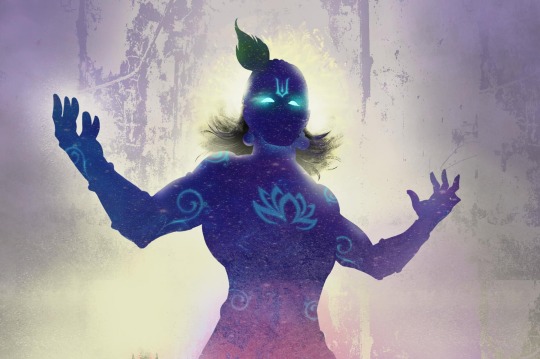
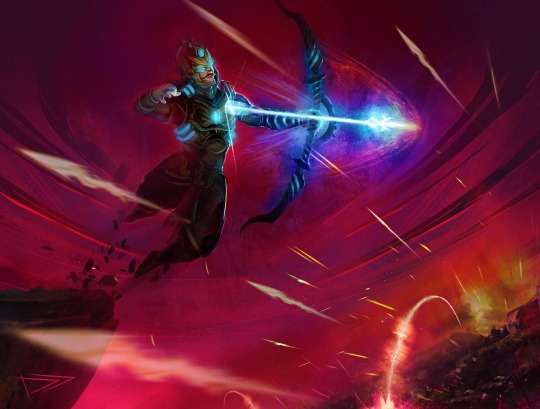
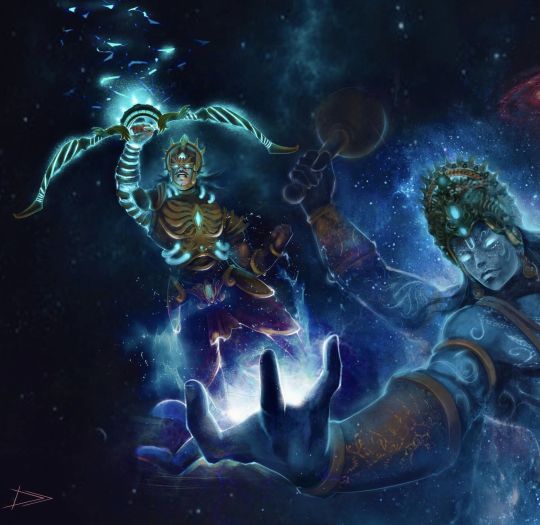
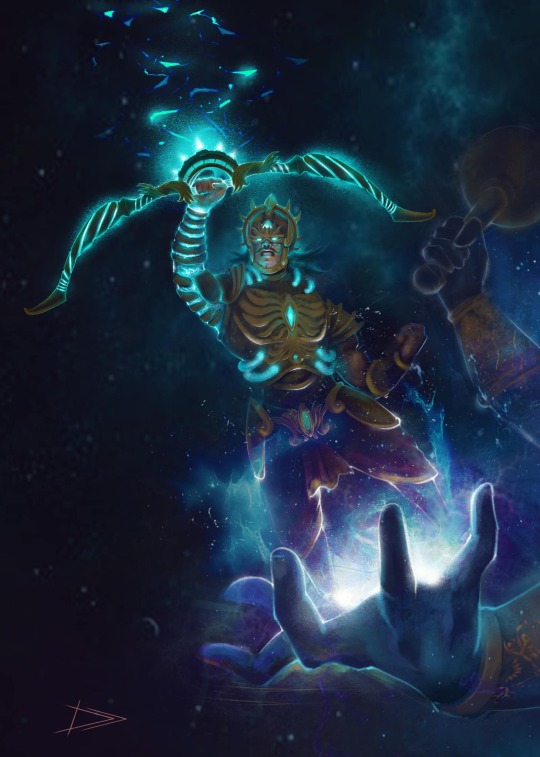
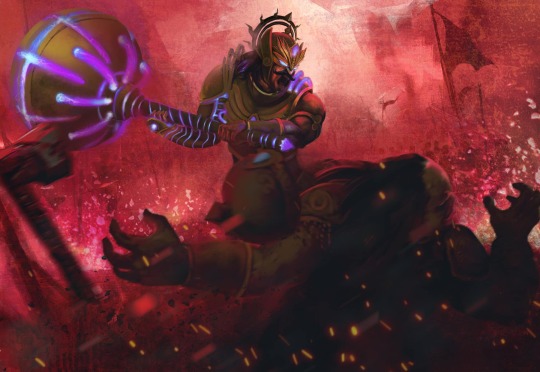
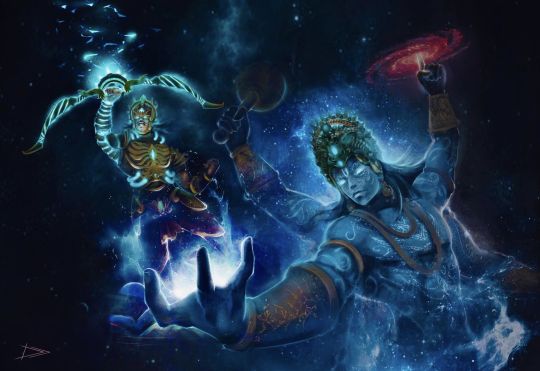
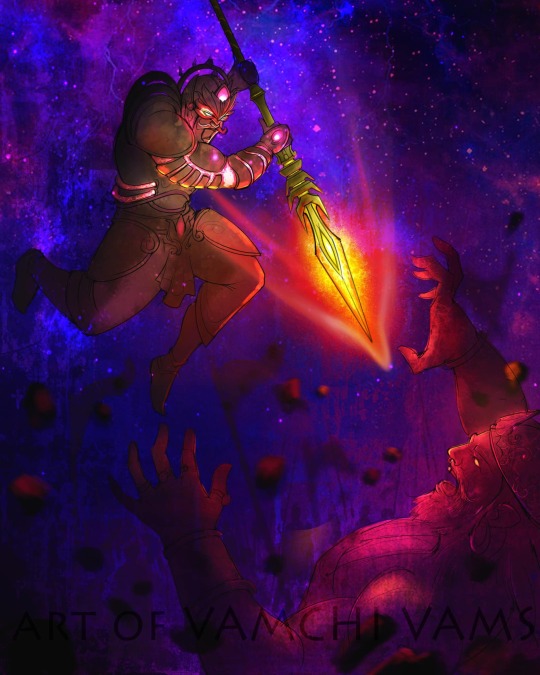
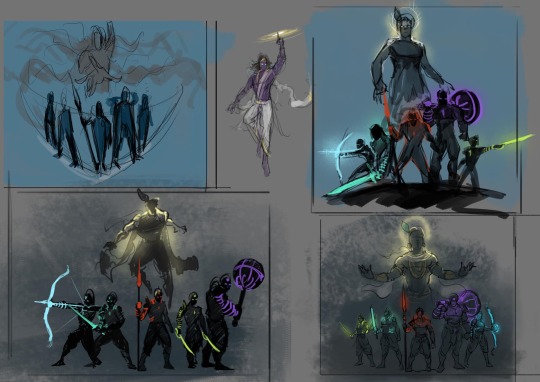
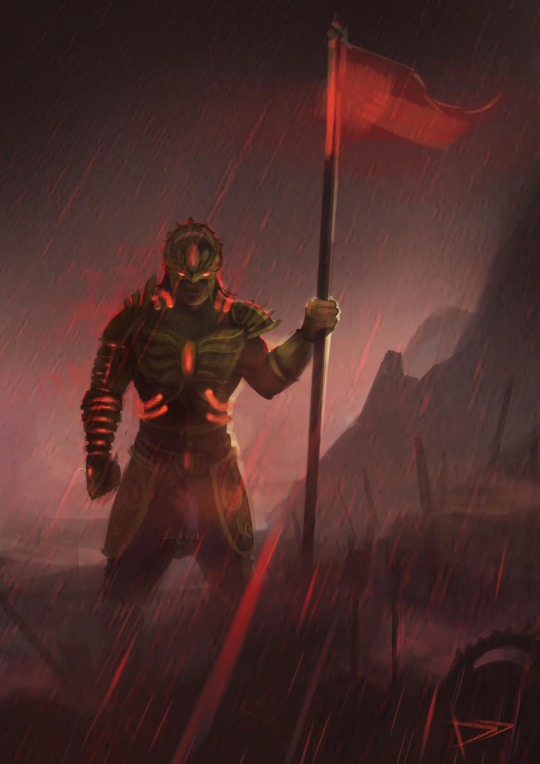
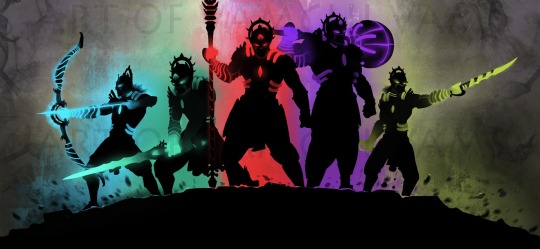
check out this stunning futuristic Mahābhārata art by Vamchi Vams!
the tendency with modern Mbh-inspired artwork is for it to still adhere to 'traditional' / historic conventions and for these to be seen as more 'accurate' renderings, but, especially with the war books (parvas), i'd maintain that one needs only to skim-read to see that the futuristic artwork most likely is a more 'accurate' representation of how the war is said to be fought. it would not be an exaggeration to claim that the astras (supranatural weapons imbued with mantras) used by warriors such as Arjuna, Karṇa & Aśvatthāmā functioned like nuclear weapons. i personally adore futuristic Mbh artwork because in my opinion it enlivens the epic & grounds it in our present as a timeless dynamic work and not as an ancient lifeless poem.
i do wonder if it is the inescapable archaic tone of 99% of the Mbh translations from sanskrit (which my dear friend Avi Sato pointed to me once & now i can't unsee!) that which contributes to this overall impression that traditional renditions * must * be more accurate. perhaps. i for one would love to see a truly futuristic translation and interpretation of the Mbh (both in literature & in film / TV) that also follows the narrative thread faithfully. might take it upon myself.
#mahabharata#mahabharat#mahabharatam#vamchi vams#hindu art#mahabharata art#krishna#govinda#gopala#hare krishna#haribol#arjuna#karna#pandavas#kurukshetra war#ashwatthama#itihasa#religion#sanskrit#bheema#yudhisthira#nakula#sahadeva#kurukshetra#hinduism#hindu mythology
29 notes
·
View notes
Text
The Defeated
So-
I've been away for the longest time, and well, so far, it seems as if it has been ages since I'd written something here, and @demonkidpliz 's writing kind of prompted me to throw it out here. Not that anyone asked for it.
Goodness, it has been so SO LONG! Just tagging people here for a slight knock. I just, love you all so so much, that I'll probably find my way in here eventually! :D
@demonkidpliz @vidhurvrika @bleedinknight @chaanv @alwaysthesideofwonder @raat-jaaga-paakhi @carminavulcana @pratigyakrishnaki @phandomoftheowl @kalpansh
And anyone else here. Heaven knows I've forgotten such a lot.
----------------------------------------------
Fandom: Mahabharat/StarPlus Mahabharat
Pairings: Bheema/Draupadi
Warnings: Mentions of War | PTSD | Trauma | Bloodshed
Summary: The Second Pandava deals with ghosts of the War. Alone.
Disclaimer: This is entirely a work of fiction, based on an idea I had while reading C. Rajagopalachari's version of the Mahabharata. But I do have to say this, this has a lot to offer that is different from the Mahabharata that is actually popular. I just hope that this resonates with the readers, and you read this, and find this worth your time and your feedback. Please leave a short comment or a like, whatever you may deem fit. And as always!
THANK YOU!
----------------------------------------------
Chapter 1:
The Shadows:
“My Lord,” an earnest call beckoned to him in the midst of a dimly-lit Kridangan. The voice doesn’t serve as an intrusion or an offence, since, his pursuit of the arena is more habitual than practical these days. Yet, a phantom lightness in his being bids him to ignore it.
“He might not have heard us, Mother,” another voice caresses his ear, this time from a boy, probably no older than Abhiman-
Vrikodara closes his eyes, in a desparate attempt to stop himself from recalling the name.
The resignation in the older woman’s conduct seems to register with him.
“Pardon me, Mother,” he says, hoping they had heard him before they left.
Hoping it would stop them.
—----
“I have no use for sparrers, Mother,” he says, much to the chagrin of the widow who had brought her son along for employment in the Palace of the Kurus. The boy’s Father, he was told, was a soldier in the cavalry of Hastinapura.
“If My Prince may spare us some consideration,” the lady kept her eyes lowered, much to Bhimasena’s relief, “my late husband, once served as a sparrer for the princes and kings in the castle, as did his father before that,”
“The Younger Queen Mother, was kind enough to refer us to you, My Lord,” she continued, breaking the Second Pandava with every word she spoke.
“Mother,” Bheema managed to speak, “I shall be obliged, if you would be kind enough to speak to The Queen,” he turned his eyes towards the boy, “I’m certain, he shall find employment elsewhere herein,”
He left, with folded hands, and his gaze lowered, before the knot in his chest tightened further.
—----
He had bid the lights to remain extinguished in their chamber. His senses do not let him recall the times when he wanted his chamber to be lit brilliantly as day after the evening prayers.
Another breath mingles with his, just as familiar to him as his own, just as forlorn to him as his own. He affords himself a momentary reprieve of letting his exhalations synchronise with hers. Her shapely silhouette offers him with some semblance of solace. It behooved him to receive her sobriety. After all, he had always known her to receive his thoughts even before they could make their way to his lips.
—----
“There has been no correspondence from Ekachakra, yet again,” she almost whispers.
Bheema’s hands clasp the edge of the bed, brushing close to that of his wife for that year.
Panchaali lets her right hand rest on his left, hoping to partake her husband’s discomfort. Yet, she doubted if an iota of his grief had been assuaged by any measure.
“Hidimba,” Bheema breathes the name, akin to a prayer, as if expecting his firstborn to walk in through the doors, smiling warmly from ear to ear, unscathed, unblemished, probably an older likeness of the boy he had seen earlier today.
“She’s meteing a punishment that befits the sin I have accrued, it seems,” Panchaali’s breath cuts through the air with its characteristic lotus fragrance. She doesn’t strain a tear either.
Crying would make it easier, she chides herself.
Crying would lessen my penance, her resolve affirms.
“Hidimba has never been unfair, Panchaali,” he tells her impassively, as she feels the tremor in his voice.
Another confabulation of silences followed.
#Mahabharat#mahabharata#bheema#draupadi#inksplotch#Ugh! I don't know if posting this was a good idea in the first place#And I know this is terrible#man! Have I rusted#and I wasn't very good in the first place anyway#writing stuff#writers on tumblr#writeblr
32 notes
·
View notes
Text
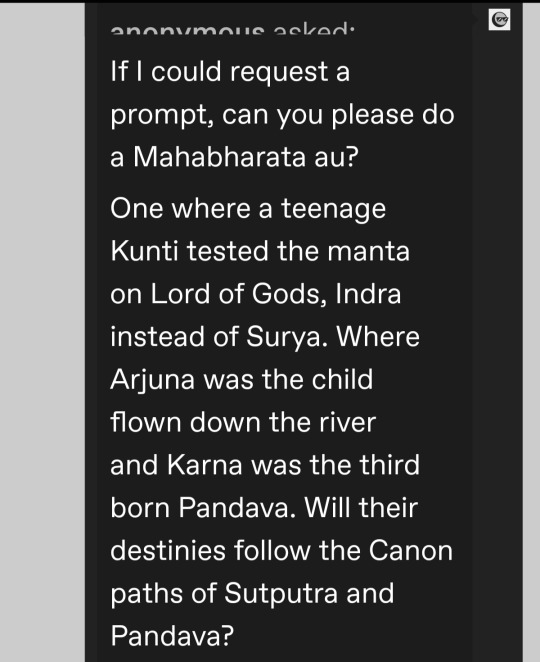
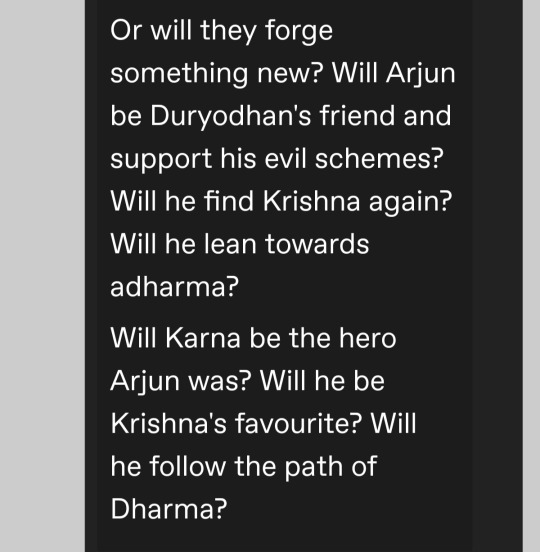
Hello there anon, and thank you for the prompt! I got so excited with this I accidentally posted your ask without answering it (I'm so sorry😭😭) so I'm afraid I have to use a screenshot. I hope you like reading this!
Character Swap - Arjuna and Karna
1.
Phalguna comes to Kuntidesha as it always does, but this year the air is colder, and the soil is wet with rain. The ponds are full and even rivers flow swifter, for Indra turns his eye upon them.
Princess Pritha bears the last few weeks of her womanly toil with ill grace; she is yet sixteen, face perpetually wrinkled in agony. The King of Gods has promised her maidenhood, Pritha thinks she would have given that up to be rid of this soreness.
When her time comes one cloudy eve, her trusted maid kneels by her screaming self, and snips the cord off a divine child.
The babe is soft and beautiful, with her looks and her smile and her curled hair; he yawns in restless sleep like a little dark moon. Pritha’s head is bent in prayer, her still-young heart is numb. She is a princess of two noble Kings, a star in the darkness of Āryavarta. Few women have her fortune, even lesser have her power, and yet she is just another girl, at the mercy of sages and gods, and the thought makes Pritha's head bow lower.
She stands by the raging Aswa as her maid gently sets the basket afloat, for foolish she may be, but cruelty comes only through her orders, and never by her hand, and the sky shatters with thunder and rain. Of all the recipients of Indra’s wrath, there has never been one more tragic.
His father from his heavenly throne names the child Arjuna, swears to guide and lead and bestow divine counsel, but as songs later let us know: he is ever known by his mothers’ names, for he is Rādha and Pritha's son.
2.
Karna is born the last of Kunti’s sons, and the third of Pāndu’s scions. He comes into the world like a shining light, with her face and her smile and her curls in his hair. For the first few weeks, Kunti cannot bear to look at the babe, and nurses him with her eyes to the sky. The sun shines upon them, bright and reprimanding, and Kunti wills Surya to chastise his own brother.
To Mādri she says, and to a concerned Pāndu, that the birth tired her, to the child she murmurs tales of a long-lost brother.
“He looked just like you,” Kunti tells him, as Karna swings in his cradle. It is a rickety thing, old as Yudhisthira, and worn with Bheema’s fervour, but it is a cradle still, and Kunti wonders if her other son ever knew one.
“I think you would have loved him,” Kunti says, wistfully, weaving dreams out of her yearning. “He would have been your big brother.”
The boy in the cradle coos at her, toothless smile lighting up the world, and for a moment his face is dark, and outside it rains, and the babe in her arms is Indra’s child.
3.
“You are terrible,” Arjuna scowls at Duryodhana, even though his father has taken great pains to counsel him otherwise. “He is just having fun.”
Duryodhana turns an interesting shade of purple. “His fun involves beating up my brothers and acting innocent when Pitāmaha asks him about it.”
Arjuna has no reason to defend this new prince, one whom he has never seen nor met, but his mouth betrays him once more. “That is not a good enough reason to kill him. You are merely jealous.”
“Kill whom?” says a voice, and Arjuna nigh jumps out of his skin as a boy swings down from the mango tree.
“Karna,” Duryodhana sighs. “Are you troubling the squirrels again?”
“No,” the boy says, shoving his fist behind his back. He is barely five and... light; his eyes are light and honey-brown, his hair is the light of sunshine on tree-barks, and his face glows like day. “You’re going to kill my brother,” he repeats stubbornly.
Arjuna blinks; his father would not forgive him for this.
Duryodhana sighs once more. “Your brother is beating mine up.”
“I will tell him not to,” Karna promises, and Arjuna is a little sorry for the boy – all wobbling lips and earnest eyes. “I will tell Mother if he does. Please don’t kill him.”
Arjuna expects Duryodhana to say something like ‘Run along, child’ or ‘Do not eavesdrop on your elders’, but the prince has an indulgent, almost fond look on his face.
“Give me that,” he says, pointing at the hand Karna has behind his back. Arjuna thinks it a cruel thing to ask, then the boy reluctantly brings out a bursting handful of areca nuts, and Arjuna has to laugh.
Duryodhana smiles as well, plucks one of the six in his hand. Karna drops two others, and as he bends to retrieve his fallen treasures, Duryodhana ruffles his hair.
“Run along now, little scamp,” the Kaurava prince says.
“Are you going to kill him?” Karna asks, eyes wide and worried.
“No,” Duryodhana assures him, “but remember what we agreed, yes?”
Karna beams at them, one after the other. “I will! See you.”
With that, he is gone.
Duryodhana cracks the nut and hands half of it to Arjuna – sinfully possessive one moment, impossibly generous the next.
Arjuna gapes at him. “Are you really not going to kill Bheem?”
Duryodhana glowers at him. “Go lay an egg,” he says, rudely, and stalks off. Arjuna stares at his retreating back, confused.
But no news comes that day, or the next, or any of the weeks after, and slowly, Arjuna learns to breathe easier.
4.
“Who is that?” Krishna asks.
Karna starts, he has not been paying attention. Krishna is the scion of faraway Dwārika, and not much of an acquaintance in any manner of the term, although the dark haired prince claims he has hardly ever been outside Vrindāvan, and never to the city by the sea.
“Pardon me,” Karna says, contrite, “whom do you speak of?”
“That boy,” says Krishna, and points towards a lone figure lurking by the stables.
“That is Arjuna. His father is Pitāmaha's charioteer.”
“May I speak to him?”
“Excuse me,” Karna hails the older boy, “can you spare a moment?”
Arjuna appears at his side, all muddy fringes and stiff bows. “Greetings, princes.”
“Greetings,” Karna nods. “This is Krishna, my cousin. Krishna, Arjuna.”
Krishna is tall and dark, his young face beams with pleasure. “How do you do, Pārtha?”
Arjuna blinks. “Uh... I am not called that. My mother’s name is Rādha.”
Krishna gives him a secret smile, and waves at someone above his head. Karna, distracted by a squirrel, nearly misses it.
“Duryodhana?” he says, delighted, when he notices the other boy on the balcony. “Come down, come down.”
Krishna shakes his arm. “Perhaps, the four of us can go to the garden?”
Sometime later, the four of them are seated around a bush, shears in hand. The rose shrub is not big enough to make a topiary out of, but Queen Gandhari has arranged tables around it with the hopes of giving the boys a more fruitful pastime to channel their excitement into.
“And what should I do?”
Arjuna is seated beside Krishna, facing the others. Duryodhana picks up his shears and snips a stray leaf. “We have to make this appear smooth and shapely.”
“Why?”
Karna stares at him. “Because Aunt Gandhari says so, of course.”
Krishna pulls his legs up on the bench, lifts a fist to the air. “Let’s dooo it!”
For the next couple of hours they work diligently, or at least pretend to, for Duryodhana starts kicking Karna under the bench, and Karna kicks him back, and it is an entertaining game; Krishna, meanwhile, shows Arjuna how and where to snip – he has clever eyes, and his hands are dexterous.
When they finally leave, one side of the bush poorer than the other, Krishna swings his hands around his new friend’s shoulders and lags behind the two princes. “You were saying Guru Drona does not want to teach you?”
Arjuna flushes. “That is true. It is er... his choice, of course, no disrespect intended.”
Krishna’s eyes twinkle. “Dau and I are going to study with Guru Sāndīpani. Do you wish to come with?”
Arjuna chances a glance at Karna, barely jealous, but there still. “I think I would like that.”
5.
“Can we not do this here?” Arjuna hisses. His father looks over from the garden where he and Rādha Mā are talking to Lord Bhishma, and Arjuna is afraid.
“Come now,” Duryodhana groans. “We are settling it man to man, just as Pitāmaha wanted. What is wrong now?”
Arjuna glances at the Pāndava brothers, aching with the weight of Anga’s crown and the knowledge of the Jatugrīha. “Why am I a part of this conversation?”
Yudhisthira coughs politely, as he is wont to. It gets on Arjuna's nerves like nothing else. “If you will excuse me,” he says, “we must greet our mother.”
The Pāndavas glance up as one, and Arjuna notices Dowager Empress Kunti hurrying down the steps.
“Mother,” Karna and Sahadeva exclaim excitably and there is a flurry of motion as they settle down to accept their blessings. To his surprise, Duryodhana follows, and he is compelled to join in the flock.
“There you are, darling,” Kunti says, pulling him up, then freezes.
Something old and forgotten stirs within Arjuna – a shadow of a memory, a wisp of a dream, a woman still as a flame with a child in her arms. Mother, he nearly says, ancient words soaring to his mouth, the shapes of them lingering on his tongue. Mother, look what we have brought home.
Then the Grandfather joins them and the moment is gone.
His father throws him a disapproving glance, and Arjuna shrinks from the princes. His mother, though, is staring at Karna.
“Vāsu...?” she whispers, as if to a ghost, and Karna turns.
“Yes, Mā?”
“His name is Karna,” Bheema declares loudly, and glares at them. The prince has not yet forgiven Arjuna’s stunt at the Graduation, even if Karna claims he would have done the same.
Radha Mā looks flustered, and Karna shifts in discomfort, as if put on a stage for a part he does not know how to play. Adhiratha grabs Arjuna and wraps an arm around his wife.
“Please forgive her, Prince,” he says, and starts pulling them away. “By your leave...”
Arjuna supposes they have embarrassed his father enough. His mother walks as if in a trance. “Vāsu?” she murmurs under her breath. “Vāsusena... child, where are you gone?”
Arjuna, alarmed, turns one last time. Karna is miserable and bewildered, staring after Rādha like a lost child, and Kunti's eyes, seeking him, are wet with tears.
+1
Arjuna sits silent and still, horror trembling beneath his skin like a fluttering bird.
“Duryodhana, please...” Arjuna whispers, unsure of what he begs, and fearful of the prince's wrath.
“I bet my brother, Karna,” Yudhisthira says, drunk on dharma and shivering with repentance. “If I win, I shall have him and all that is on the board; if you do, then he is yours.”
Karna looks up, stunned. There is betrayal on his face, and Arjuna’s heart stings. Even Duryodhana frowns, for Karna alone of all his cousins he names a friend.
“As you say,” Shakuni shrugs, and rolls his dice. “Lo! I win!”
Karna rises from his seat without being asked, walks over to kneel beside his brothers. His mien is smooth and calm now, all torment shielded behind a mask, but Bheema leaps up, enraged.
“Brother!” he tells Yudhisthira, “Hear me! Cease this madness before you lose all else.”
“I cannot leave them to this fate, Bheema,” Yudhisthira says, and picks the dice again. “I stake Bheema.”
“No, wait,” Duryodhana says, brows furrowed. “Māmāshree, do not bet now.”
The two players look up.
“No more?” Yudhisthira repeats slowly, as if he thought this game would go on forever, till the last brother was staked, and perhaps his wife and mother as well.
“Are you sure, my dear?” Shakuni asks.
Duryodhana ignores both of them, strides over to Karna. “Come with me.”
“I shall split your head open,” Bheema roars from beside Yudhisthira. “Leave him alone.”
“I won him,” Duryodhana reminds him coldly, “and I would that he comes with me.”
Karna rises with a grace that startles Arjuna, no longer the clumsy middle prince who dropped things, just like he is no longer a charioteer's dutiful son.
“I will go,” he says, and Yudhisthira turns to the court at large. “Please forgive my brother’s outburst.”
Arjuna wants to slap him.
Duryodhana wraps an arm around Karna's shoulders, and steers him to the doors. For a moment it appears that Bheema would follow, but then the Kaurava prince dismisses the guards, and they step just outside, far enough so no one can overhear whispers, but near enough that they are seen, and a fuming Bheema sits back down.
Arjuna sits and waits for a long time, like all others at court, even the blind Emperor, who can never walk without his son, and thinks miserably of how much Krishna would disapprove.
He is about to join them, either to pacify or to add fuel to the fire, when Karna speaks, loud and sarcastic enough to be heard all over the court. “I loved it. I loved it so much I am going to write a play about it, and have actors sent to perform it all over Āryavarta. Why, I should- ”
Duryodhana catches his flailing hands, shushes him. They whisper once more. The blind Emperor swivels his head in apparent confusion. Arjuna gets up to intervene.
Then Duryodhana walks in, a furious Karna in tow.
Arjuna seizes him by the arm. “Let them go, Duryodhana,” he pleads. “Do not do this.”
His patron and friend...? looks at him quietly for a long time, so long that Arjuna very nearly reaches for his bow.
Dhritarashtra, for once in his life, takes the cue. “Court is dismissed,” he calls, and the ordeal is over.
“You have counselled me wisely,” Duryodhana says at last. “Now, and before. It is a shame that I heeded you not.” Then he raises his head and says aloud, without preamble or explanation, “Let all be returned and restored to the Pāndava princes. Thank you, noble ones, for joining us in this game. We shall retire soon for lunch.”
Two years later, when the knowledge of the game is a rumour, and the incident at Indraprastha's lake is forgotten, Karna comes alone to Hastinapura. Krishna, who is visiting, gives Arjuna one of his secret smiles.
At the gates, Duryodhana meets him stiffly, for things have never been the same between the two sets of cousins. They bow ceremoniously, Dhritarashtra speaks a few half-hearted greetings, and Gandhari fusses over him.
Karna and Duryodhana stare at each other, and then Karna wraps him in a fierce hug.
“You’re not forgiven,” the Pandava prince says, voice muffled, but Arjuna notes Karna's trembling hands and thinks he knows otherwise.
Then, to his surprise, Karna turns to him. Krishna smiles at him again and whispers, “Prepare yourself, Angarāja.”
Before Arjuna can ask him what he means, Karna bows to him and says, “Greetings, brother.”
#draupadi is not included in this fic bc my girl does not deserve the kuru's stupidity in any of the timelines#i do not take criticism regarding that#yudhishthir#yudhisthira#bhim#bheema#arjuna#boo writes#arjun#karna#karn#sahadeva#sahadev#duryodhana#duryodhan#bhima#bheem#krishna#5 + 1 fic#ask response#anon ask#fics#anon answered#mahabharata#mahabharat#hindu mythology#kunti#radha
12 notes
·
View notes
Text
youtube
In light of my new hyperfixation, here is the video that got me into RRR
#cinema therapy is the best#i love them#cinema therapy#rrr 2022#rrr movie#rrr#alluri sitarama raju#bheema#Youtube
37 notes
·
View notes
Text
BHEEMA B1-ICQ

Origin: krtrim (asatya)
Status: posthuman, piloting a Class-3 military 2029 CHOSHI-II vessel (modern Delhi variant) distributed by OURO
Nationality/ethnicity: American, living in Britain. IRIDESCENT color ID
Age: 30KR (actual age is 23KR)
Occupation: assistant head of security for the New Disciples of Mesmer
About:
Bheema is a repossessed krtrim Essence given fabricated memories (known as an asatya). Though she is actually only 23KR, she is mentally 30KR. She has no last name.
Bheema was deployed by the American military during the Tangent War. After the trauma of seeing her close teammates die, she realized her memories were not actually true, and developed ROMAD (rapid-onset magnetic actuator deviancy) or as it’s more commonly known, Corruption. This brought her close to death, but she managed to be one of the lucky few who survive, though at the cost of her personality and morals. She was shortly thereafter bought by Cassandra Mallory to be her personal body guard.
Bheema is cold and emotionally stunted. She views herself as a machine. She’s a stickler to the rules and always follows orders. However, she still shows elements of character through her sarcasm and cruel sense of humor. Her and Francis get along very well for this reason.
Background:
Bheema cannot remember much, if any of her past, nor does she consider it significant. Her condition as an asatya compounds this issue.
10 notes
·
View notes
Text
Bheem by me. Color version didn’t look that good so I went with this lol.
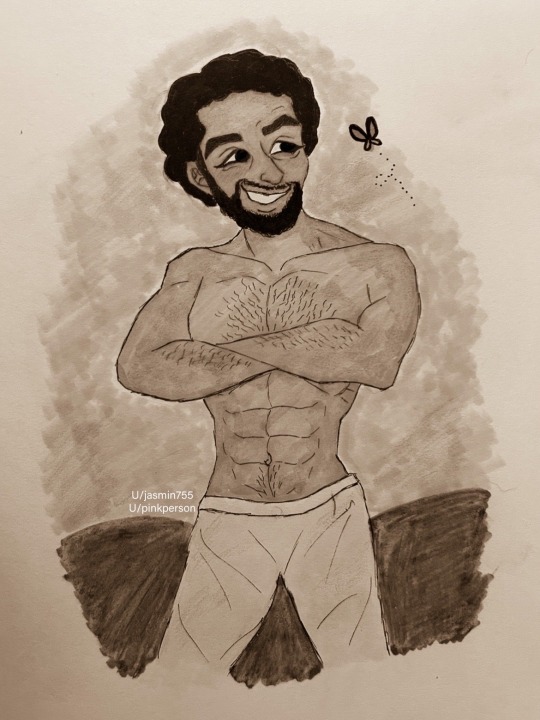
15 notes
·
View notes
Text
Touchy touchy hmm I see ram 😏😏
#rrr fanfic#tarak#rrr fandom#rrr film#rosayounan#jr ntr#komuram bheem#rrr fanart#ss rajamouli#rrr movie#ram x bheem#bheemram#bheem#bheem x reader#bheema#rambheem#ram charan#ram x reader#jr. ntr#alluri sitarama raju#bheem rrr#newpost#rrr fanfic#rrr memes#@tumblr#@fire#nandamuri taraka rama rao jr#charak
120 notes
·
View notes
Text
Ram and Bheem in their plushie version.
Had a lot of fun sewing them.
More Outfits are planned, Ram's beard is detachable so he only has a moustache.
~30 cm tall
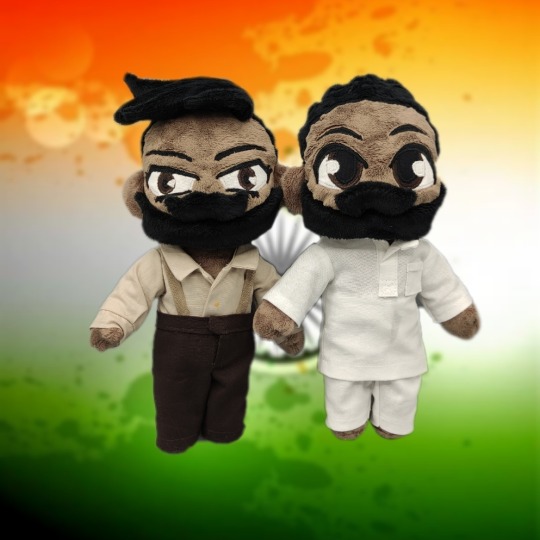

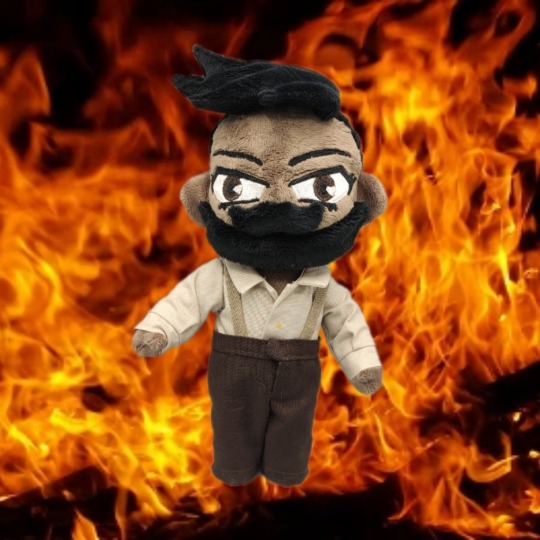
#rrr fandom#ram charan#rrr movie#rambheem#tarak#charak#komaram bheem#bheema#ram x bheem#alluri sitarama raju#rrr fanart#selfmade plushies#sewing
48 notes
·
View notes
Text
RAHHHHH I LOVE BHEEM SO MUUUUXHHHHHHHHHH
12 notes
·
View notes